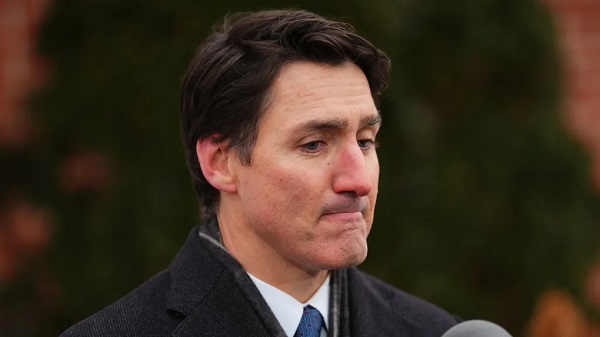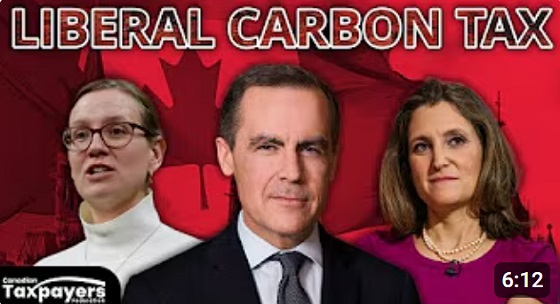National
Canadians challenge Prime Minister’s decision to prorogue Parliament: “no reasonable justification”

 From the JCCF
From the JCCF
The Justice Centre for Constitutional Freedoms is providing lawyers on an urgent basis to two Canadians, David MacKinnon and Aris Lavranos, seeking a Federal Court declaration that Prime Minister Trudeau’s recent prorogation of Parliament is unreasonable and must be set aside.
When Parliament is prorogued, the parliamentary session is terminated, and all parliamentary activity, including work on bills and in committees, immediately stops.
Among its many grounds arguing that Trudeau’s decision to advise the Governor General to exercise her prerogative power to prorogue Parliament to March 24, 2025, this application argues that the decision to prorogue Parliament was “incorrect, unreasonable or both.” The court application, filed today, contends that the Prime Minister’s decision to prorogue “was not made in furtherance of Parliamentary business or the business of government, but in service of the interests of the LPC [Liberal Party of Canada].”
At his news conference yesterday, on January 6, 2025, the Prime Minister’s stated justification for the prorogation was (1) to “reset” Parliament and (2) to permit the Liberal Party of Canada time to select a new party leader. No explanation was provided as to why Parliament could not recess instead. No explanation was provided as to why Members of Parliaments could not immediately exercise their right to vote on a motion of non-confidence in the government. A majority of MPs have now repeatedly promised to do just that, which would trigger an election and provide the needed “reset” in a democratic and legitimate way.
No explanation was provided as to why a prorogation of almost three months is needed. No explanation was provided as to why the Liberal Party of Canada ought to be entitled to such a lengthy prorogation simply so it can hold an internal leadership race.
This Federal Court application includes language taken from a decision of the Supreme Court of the United Kingdom, which ruled in 2019 that then-Prime Minister Boris Johnson had prorogued Parliament unlawfully, as a means of avoiding Parliamentary scrutiny over the government’s “Brexit” negotiations concerning the departure of the United Kingdom from the European Union.
The application contends, among other things, that “in all of the circumstances surrounding it, the [prorogation] has the effect of frustrating or preventing, without reasonable justification, the ability of Parliament to carry out its constitutional functions as a legislature and as the body responsible for the supervision of the executive, particularly insofar as it relates to Parliament’s ability to deal quickly and decisively with especially pressing issues, such as the situation caused by President-Elect Trump’s stated intention to impose a 25% tariff on all goods entering the United States from Canada.”
“This prorogation stymies the publicly stated intent of a majority of MPs to bring a motion for non-confidence in the government and trigger an election. Prorogation serves the interests of the Liberal Party, but it does not further Parliamentary business or the business of government. It violates the constitutional principles of Parliamentary sovereignty and Parliamentary accountability,” stated lawyer James Manson. “We will invite the Court to conclude that the Prime Minister’s decision to advise the Governor General to prorogue Parliament was without reasonable justification.”
Applicant David MacKinnon feels strongly about this case. He stated, “This case concerns a living tree – our Constitution – and how that living tree withers without proper care. If we are to fight tyranny – for it is tyranny that confronts us – we must find the answer within the memory of our historical past. We call this memory ‘the common law.’ It is enshrined in the preamble of our constitution. The common law is the repository and guarantor of our justice and our wealth and happiness. Had we nurtured our living tree, and looked to our past, we would have read Lord Denning’s admonishment to the Attorney General of an earlier time: ‘Be ye never so high, the law is above you.’”
2025 Federal Election
MEI-Ipsos poll: 56 per cent of Canadians support increasing access to non-governmental healthcare providers

-
Most believe private providers can deliver services faster than government-run hospitals
-
77 per cent of Canadians say their provincial healthcare system is too bureaucratic
Canadians are increasingly in favour of breaking the government monopoly over health care by opening the door to independent providers and cross-border treatments, an MEI-Ipsos poll has revealed.
“Canadians from coast to coast are signalling they want to see more involvement from independent health providers in our health system,” explains Emmanuelle B. Faubert, economist at the MEI. “They understand that universal access doesn’t mean government-run, and that consistent failures to deliver timely care in government hospitals are a feature of the current system.”
Support for independent health care is on the rise, with 56 per cent of respondents in favour of allowing patients to access services provided by independent health entrepreneurs. Only 25 per cent oppose this.
In Quebec, support is especially strong, with 68 per cent endorsing this change.
Favourable views of accessing care through a mixed system are widespread, with three quarters of respondents stating that private entrepreneurs can deliver healthcare services faster than hospitals managed by the government. This is up four percentage points from last year.
Countries like Sweden and France combine universal coverage with independent providers and deliver faster, more accessible care. When informed about how these health systems run, nearly two in three Canadians favour adopting such models.
The poll also finds that 73 per cent of Canadians support allowing patients to receive treatment abroad with provincial coverage, which could help reduce long wait times at home.
Common in the European Union, this “cross-border directive” enabled 450,000 patients to access elective surgeries in 2022, with costs reimbursed as if they had been treated in their home country.
There’s a growing consensus that provincial healthcare systems are overly bureaucratic, with the strongest agreement in Alberta, B.C., and Quebec. The proportion of Canadians holding this view has risen by 16 percentage points since 2020.
Nor do Canadians see more spending as being a solution: over half say the current pace of healthcare spending in their province is unsustainable.
“Governments shouldn’t keep doubling down on what isn’t working. Instead, they should look at what works abroad,” says Ms. Faubert. “Canadians have made it clear they want to shift gears; now it’s up to policymakers to show they’re listening.”
A sample of 1,164 Canadians aged 18 and older was polled between March 24th and March 28th, 2025. The margin of error is ±3.3 percentage points, 19 times out of 20.
The results of the MEI-Ipsos poll are available here.
* * *
The MEI is an independent public policy think tank with offices in Montreal, Ottawa, and Calgary. Through its publications, media appearances, and advisory services to policymakers, the MEI stimulates public policy debate and reforms based on sound economics and entrepreneurship.
2025 Federal Election
POLL: Canadians say industrial carbon tax makes life more expensive

The Canadian Taxpayers Federation released Leger polling showing 70 per cent of Canadians believe businesses pass on most or some of the cost of the industrial carbon tax to consumers. Meanwhile, just nine per cent believe businesses pay most of the cost.
“The poll shows Canadians understand that a carbon tax on business is a carbon tax on Canadians that makes life more expensive,” said Franco Terrazzano, CTF Federal Director. “Only nine per cent of Canadians believe Liberal Leader Mark Carney’s claim that businesses will pay most of the cost of his carbon tax.
“Canadians have a simple question for Carney: How much will your carbon tax cost?”
The federal government currently imposes an industrial carbon tax on oil and gas, steel and fertilizer businesses, among others.
Carney said he would “improve and tighten” the industrial carbon tax and extend the “framework to 2035.” Carney also said that by “changing the carbon tax … We are making the large companies pay for everybody.”
The Leger poll asked Canadians who they think ultimately pays the industrial carbon tax. Results of the poll show:
- 44 per cent say most of the cost is passed on to consumers
- 26 per cent say some of the cost is passed on to consumers
- 9 per cent say businesses pay most of the cost
- 21 per cent don’t know
Among those decided on the issue, 89 per cent of Canadians say businesses pass on most or some of the cost to consumers.
“Carbon taxes on refineries make gas more expensive, carbon taxes on utilities make home heating more expensive and carbon taxes on fertilizer plants increase costs for farmers and that makes groceries more expensive,” Terrazzano said. “A carbon tax on business will push our entrepreneurs to cut production in Canada and increase production south of the border and that means higher prices and fewer jobs for Canadians.”
-

 2025 Federal Election2 days ago
2025 Federal Election2 days agoNo Matter The Winner – My Canada Is Gone
-

 2025 Federal Election2 days ago
2025 Federal Election2 days agoASK YOURSELF! – Can Canada Endure, or Afford the Economic Stagnation of Carney’s Costly Climate Vision?
-

 Alberta2 days ago
Alberta2 days agoMade in Alberta! Province makes it easier to support local products with Buy Local program
-

 2025 Federal Election2 days ago
2025 Federal Election2 days agoCSIS Warned Beijing Would Brand Conservatives as Trumpian. Now Carney’s Campaign Is Doing It.
-

 2025 Federal Election1 day ago
2025 Federal Election1 day agoInside Buttongate: How the Liberal Swamp Tried to Smear the Conservative Movement — and Got Exposed
-

 Alberta2 days ago
Alberta2 days agoProvince to expand services provided by Alberta Sheriffs: New policing option for municipalities
-

 Bruce Dowbiggin1 day ago
Bruce Dowbiggin1 day agoIs HNIC Ready For The Winnipeg Jets To Be Canada’s Heroes?
-

 Dr. Robert Malone1 day ago
Dr. Robert Malone1 day agoThe West Texas Measles Outbreak as a Societal and Political Mirror








